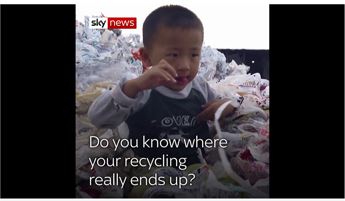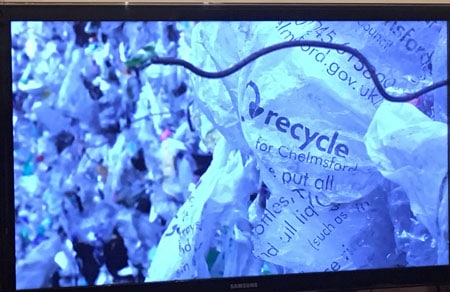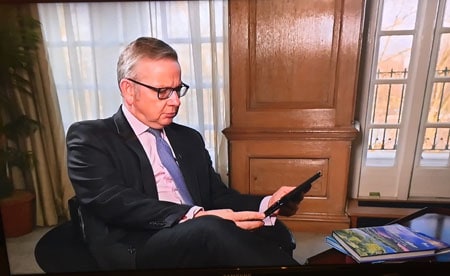Recycling is prominently on the news agenda this week with Sky television questioning the PRN system and also reporting on plastics recycling and how low quality material is being exported.
The Sky News documentary ‘Dirty Business’ was first aired on Wednesday evening on Sky Atlantic and will be rerun tonight (Friday 26 January) at 9.00 pm on Sky News. [This article is a précis of the programme, so please do not read if you don’t what to know the main points of the programme before watching it tonight.]
It is thought that filming of the documentary started last autumn and was concluded only recently with an interview with Michael Gove, secretary of state for the environment. The programme is expected to be of interest to the recycling sector and government and has already provoked a reaction within the recycling sector. A short video of the programme can be seen at Sky News.

At one point the programme shows a child playing in plastic scrap for recycling
PRN system
The programme queries whether the PRN system, which can see the evidence of recycling notes issued on plastics exported or reprocessed in the UK, is encouraging exports and also environmental damage as a result (see Sky News report).
The programme starts with a look at how Serco collects recyclables from reporter Nick Martin’s home in the Derbyshire Dales council area.
There is then a cut to John Gummer – Lord Deben – former secretary of state for the environment and now chairman of Valpak who notes that the UK “used to recycle very little indeed” and now “some products are recycled at 40%, others at practically nothing”.
Viridor’s Rochester plastic bottle recycling facility is featured with Jeremy Blake, head of polymer assets, interviewed. He describes how “we take in material from people’s bins and turn it back into a commodity”, with an emphasis on waste as a resource.
Barry Turner of the British Plastics Federation explains that the plastic waste will go where the highest demand is while waste management consultant Phil Conran (of 360 Environmental and who also chairs the Advisory Committee on Packaging) says the plastic is a resource that gets used to make a product.
China
There are shots of sorting in China with basic looking plants, some children and handsorting. The crackdown by Chinese authorities on poor quality material is explained and Hong Kong is shown as the artery to China for plastic scrap.

Chelmsford council recyclables are featured by Sky Atlantic and Sky News as being found in Poland and China
The well-known waste sector expert Nigel Mattravers, who now works in Hong Kong, features during the programme and declares that the UK has moved the problem away to China to achieve recycling targets. “China is a cheap easy solution, you put it in a container at Felixstowe and bye, bye!”
Tony Wong in Hong Kong, who works in plastics recycling, says that a container could have a value of $10,000 – “I see the business, I see the money”, but then he points to poor quality bales which he can’t move.
The programme explains that neighbouring countries are being used to send plastics to from the UK and there is a cut to a plastics site in Thailand.
Monoworld
Then Monoworld Recycling of Rushden feature and director Lee Clayton explains that it is easy to put material in a container and export it, rather than spending significant amounts of money putting it into a processing plant. “It is well known there is a poor auditing system for material that goes to China or Asia particularly.”
Mr Clayton is critical of the PRN system and the programme claims that exporters get a full PRN for every tonne of material exported while in the UK if part of the tonne is rejected, more recycling would be needed to issue a PRN, as the rejected amount cannot be counted.
The defunct Ecotech carrier bag site in London is visited with the former director Javed Mawji also criticising the PRN system as failing UK reprocessors (see letsrecycle.com story).
Dominic Hogg of Eunomia said that the PRN system should be “properly accounting for recycling”. Then, Lord Deben, appearing to reference the problems with the export PRUN, says that it is a serious flaw, “that we don’t know quite a bit of what happens. We should have a system where we are more likely to use it at home.”
The programme then uncovers material from Chelmsford in Hong Kong which appears to be in a poor state and Chelmsford council officials are interviewed.
Chelmsford material is then found at a site in Poland and appears to be abandoned.
Again, the PRN is questioned by the programme as it is likely that PRNs were generated on the material.

Michael Gove on the Sky News programme looking at a video of film of Chelmsford council material
Lord Deben
Towards the end of the programme, Lord Deben identifies a number of problems including.
1. Not having sufficient control of where material goes.
2. Insufficient control of what is in the bales. You can have things mixed up in that material which aren’t going to be recycled.
3. China is now not accepting the material and that it should be recycled here or in Europe.
4. “PRN exports, that’s nonsense and we should change it.”
Michael Gove
The programme concludes with an exclusive interview with Michael Gove we says that too much waste has been exported and that more should be processed within the UK.
The post Sky News programme questions export PRNs appeared first on letsrecycle.com.
Source: letsrecycle.com Plastic


